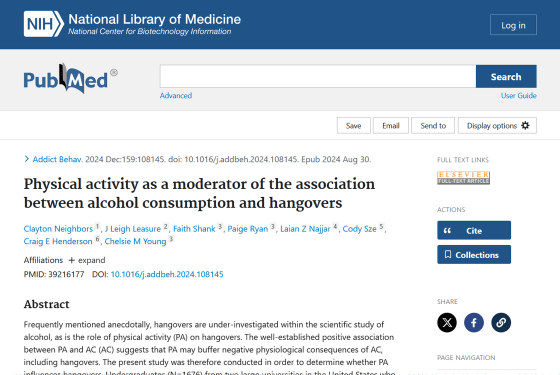Study says regular exercise helps reduce hangovers - here's why

A hangover caused by drinking too much alcohol can leave you with unpleasant symptoms like a severe headache, nausea, and heartburn. A new study investigating the link between hangovers and exercise has found that regularly engaging in vigorous physical activity may reduce the severity of a hangover.
Physical activity as a moderator of the association between alcohol consumption and hangovers - PubMed

Regular exercise could reduce the severity of hangovers – here's how
https://theconversation.com/regular-exercise-could-reduce-the-severity-of-hangovers-heres-how-241147
Measures to prevent hangovers include 'drinking water' and 'eating food as well as alcohol.' To investigate the relationship between hangovers and physical activity, a research team in the United States conducted a survey of 1,676 undergraduate students attending two universities in the United States who had experienced at least one hangover in the past three months and who engaged in at least 30 minutes of moderate exercise per week.
The researchers analyzed alcohol consumption patterns, levels of physical activity, and the severity and frequency of hangovers, and found that, not surprisingly, people who consumed more alcohol experienced more hangovers and those hangovers were more severe.
However, the relationship between alcohol consumption and hangover severity and frequency was reduced in people who engaged in vigorous physical activity, such as running, suggesting that higher levels of physical activity may reduce the frequency and severity of hangovers.

Following these findings,
◆1: Pain relief
During a hangover, alcohol dehydration affects the functioning of blood vessels, reducing fluid around the brain and causing headaches, and alcohol can also increase inflammation in the body, causing muscle pain by releasing immune system molecules called cytokines .
The pain caused by a hangover can be alleviated by the hormone endorphins , which are also known as the 'happiness hormones' and have been shown to have a similar effect to morphine , and regular exercise may increase baseline endorphin levels.
◆2: Improved sleep quality
Alcohol reduces REM sleep , which helps the brain recover and recover, and its diuretic effect causes frequent trips to the bathroom at night, so people who drink enough to get a hangover tend to have poorer quality sleep. However, regular exercise keeps circadian rhythms regular, improving the amount and quality of sleep, which may help people recover faster from a hangover.

◆3: Improve metabolism
Alcohol consumed by humans is metabolized in the liver, and the metabolite
◆4: Reduces inflammatory responses
When a person has a hangover, an inflammatory response occurs in various parts of the body, causing headaches, muscle pain, fatigue, and hypersensitivity to stimuli such as light and sound. However, exercise promotes the secretion of anti-inflammatory cytokines, exerting an anti-inflammatory effect , so it is thought that exercise can alleviate various hangover symptoms.

While exercise may indeed reduce hangover symptoms, exercising when you have a hangover does not necessarily cure them. 'The most effective way to prevent a hangover is to drink moderately or avoid alcohol altogether,' Brown and his colleagues said. 'However, for those who choose to drink a lot, incorporating regular physical activity into their lifestyle may help to reduce some of the suffering caused by a hangover.'
Related Posts:







